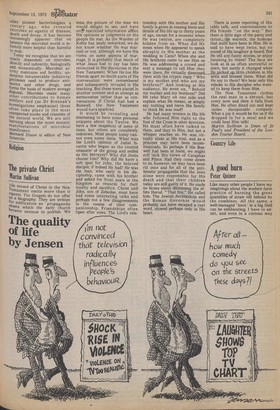Religion
The private Christ
Martin Sullivan
the record of Christ in the New Testament omits more than it reports.. The Gospels do not offer US a biography. They are written for edification as propaganda Sheets which the early church became anxious to publish. We
miss the picture of the man we would delight to see, and have onlr restricted information affiut His opinions or judgments on the people He met. As the Warden of Keble has lately remarked, we do not know whether He was married or not, although we have His views on some aspects of marriage. It is probably that much of what Jesus had to say has been recounted in His discourses in the New Testament. When He too His friends apart no doubt parts of His conversation were remembered and subsequently revealed in His teaching. But these were placed in another context and so emerge as sermonettes rather than as conversations. If Christ had had a Boswell, the New Testament would have sparkled.
It would be revealing and interesting to have some personal snippets about the Twelve. We have a few snapshots of some of them, but others are completely unknown. Most people today cannot even name them. What was the Lord's opinion of Judas Iscariot who began as the trusted treasurer of the group and ended as the betrayer? Why did Jest's choose him? Why did He have a soft spot for John, the beloved disciple, if indeed He had? He was the man, who early in his discipleship, came with his brother and asked for front seats in the Kingdom as rewards for their loyalty and sacrifice. Christ and John, son of Zebedee, must have had some interesting talks and perhaps not a few disagreements in the course of their companionship. Friendships often ripen after rows. The Lord's rela tionship with His mother and His family is given in teasing hints and details of His life up to thirty years of age, except for a moment when He was twelve, are completely hidden from us. What did He mean when He appeared to speak abruptly to His mother at the wedding in Cana? When she and His brethren came to see Him as He was addressing a crowd and sent a message to tell Him they were there, He virtually dismissed_ them with the cryptic reply "Who is my mother and who are my brethren?" And looking at His audience, He went on, "Behold my mother and my brethren!" Did He take Mary on one side and explain what He meant, or simply say nothing and leave His family to think He was mad?
He had many women in His life who followed Him right to the foot of the Cross in utter devotion.
He must often have talked to them, and they to Him, but not a whisper reaches us. He was vir tually silent at His trial, and as a prisoner may have been incom municado. So perhaps if His Bos well had been at hand, we might still lack His views of Caiaphas and Pilate. Had they come down to us, however, we may have been rid once and for all of the anti Semitic propaganda that the Jews alone were responsible for His death and that their children today are still guilty of it. He made no bones about dismissing the effete Herod. "That fox," He called him. The Jewish Archbishop and the Roman Governor would probably not have escaped a curt word, uttered perhaps only in His heart. There is some reporting of His table talk, and conversations to His friends " on the way." But there is little sign of the parry and thrust, the warmth, the humour that must have been in Him. He is said to have wept twice, but no sound of His laughter is heard. Did He tell any funny stories, or enjoy ,listening to them? The face we look at is so often sorrowful or stern, but surely it changed when _I-ie....picked up little children in His arms and blessed them. What did He say to them? We hear only His rebuke to His disciples who wanted to keep them from Him.
The New Testament clothes the real man in a shroud, but every now and then it falls from Him. He often dined out and kept rather disreputable company. What a joy it would be for us if He dropped in for a meal and we could hear Him talk!
Martin Sullivan is Dean of St Paul's and President of the London Tourist Board.
































 Previous page
Previous page